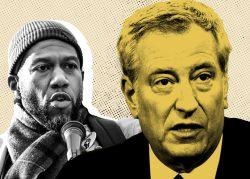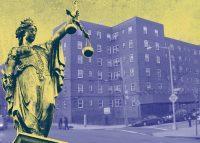Mayor Bill de Blasio primarily blames the long, painful deterioration of the city’s public housing system on a decline in federal funding as developments aged and their maintenance needs grew.
Terrible management, however, was a big part of the problem. It wasn’t just inexperienced managers and hapless mayors, though; the system itself ensured the New York City Housing Authority remained dysfunctional to its core.
Now the agency — under orders from the federal government — says it is changing that.
NYCHA announced Monday that federal prosecutors and the U.S. Department of Housing and Urban Development had agreed on an overhaul dubbed the Transformation Plan Greenlighting Implementation Phase.
Residents are hoping the plan — which is really a plan for a plan — is better than its name.
Read more



For decades, they have seen NYCHA inspectors sign off on work that was never done, union workers clock out every day before residents could let them in to make repairs, and exterminators pointlessly leave bait trays in dirt floor basements that rats effortlessly tunneled into, among many other problems and inefficiencies.
NYCHA’s current system lacks clear lines of authority, which makes it hard for the agency to get out of its own way. Its announcement Monday even refers to a “six-borough management structure,” seemingly oblivious to the fact that the city has only five. It is tempting to imagine an entire division of NYCHA workers assigned to a non-existent borough.
Scandals have abounded. At Throggs Neck Houses in the Bronx, supervisors were accused of sleeping with subordinates and having drunken parties while on the job. To generate complaints against a colleague, a manager there named Brianne Pawson sabotaged new refrigerators, according to the Department of Investigation. The agency’s repair backlog ballooned every time it was tabulated, rising to $42 billion from $17 billion in just four years.
The whole system was a mess — inefficient, unaccountable, and at times criminal.
Eventually, federal prosecutors in Manhattan stepped in and HUD threatened to take over the 177,611-unit system. Two years ago they reached an agreement with the de Blasio administration to reboot it; Monday’s announcement was part of that.
The agency said its transformation plan will change NYCHA’s governance and leadership structure, property management systems and central support functions.
Before anyone gets too excited, the changes are not being made just yet. Rather, they will be subject to many months of analysis by a laundry list of overseers: HUD, the Southern District of New York, federal monitor Bart Schwartz, tenants and other stakeholders.
“This includes evaluating the costs and benefits of each possible change and beginning to make difficult choices that are necessary to better serve residents,” NYCHA’s press release said. “These results, based on modeling and analysis, will be submitted in an Implementation Plan as a supplement to the Transformation Plan.”
Helpfully, the release adds, “Together, the Transformation Plan and the Implementation Plan will result in the Organizational Plan required in the HUD Agreement.” The Transformation Plan itself is part of a larger NYCHA plan called the Blueprint for Change, which includes a Stabilization Strategy.
Churchill’s phrase “a riddle wrapped in a mystery inside an enigma” comes to mind. (NYCHA is hoping its pact will end better than the one Churchill was referring to.)
The first part of the implementation plan is due in September and the second part in June 2022. It is not clear when implementation itself will occur.
No one is expecting miracles. “We expect implementation will not be easy,” said Rachel Fee, executive director of the New York Housing Conference, in a statement.
“But,” she promised, “it will yield results that will improve both living conditions and services for NYCHA residents.”
